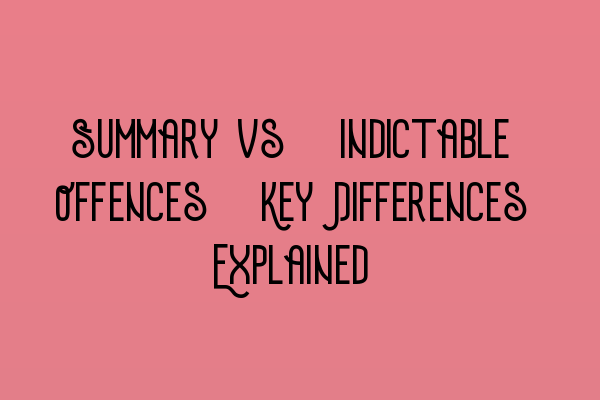Summary vs. Indictable Offences: Key Differences Explained
Understanding the key differences between summary offences and indictable offences is crucial in the field of criminal law. Whether you are a law student preparing for the SQE exams or a practicing solicitor, having a clear understanding of these distinctions is essential for providing successful legal representation.
Summary Offences
Summary offences, also known as minor offences, are usually less serious in nature and are heard in the Magistrates’ Court. These crimes are typically punishable by fines, community service, or short prison sentences. Examples of summary offences include public intoxication, petty theft, and low-level assault.
While summary offences are generally less severe, it’s important to note that they can still have a significant impact on an individual’s criminal record and reputation. Therefore, expert legal advice is crucial in navigating through the legal process and ensuring the best outcome for the client.
Indictable Offences
Indictable offences are more serious crimes and are usually heard in the Crown Court. These offences often carry higher penalties, including longer prison sentences. Examples of indictable offences include murder, robbery, and drug trafficking.
Unlike summary offences, indictable offences require a more complex legal process. They typically involve pre-trial hearings, examination of evidence, and a trial by jury. Due to the seriousness of the charges, individuals facing indictable offences should seek immediate legal representation to ensure their rights are protected.
Key Differences
Now that we have an understanding of both summary and indictable offences, let’s highlight the key differences between the two:
- Severity: Summary offences are generally less serious compared to indictable offences.
- Legal Process: Summary offences are heard in the Magistrates’ Court, while indictable offences are heard in the Crown Court.
- Penalties: Summary offences are typically punishable by fines, community service, or short prison sentences, whereas indictable offences carry higher penalties, including longer prison sentences.
- Legal Representation: While legal representation is important for both types of offences, the complexity of indictable offences often requires more specialized legal expertise.
It’s crucial to note that some offences can be both summary and indictable, known as “either-way” offences. The actual classification of an offence depends on factors such as the severity and circumstances surrounding the case.
Conclusion
Understanding the differences between summary and indictable offences is fundamental in the field of criminal law. Whether you are preparing for the SQE exams or seeking legal representation, having a strong grasp of these distinctions will greatly benefit your career and your clients.
For more information and resources related to the SQE exams and criminal law, be sure to check out the following articles:
